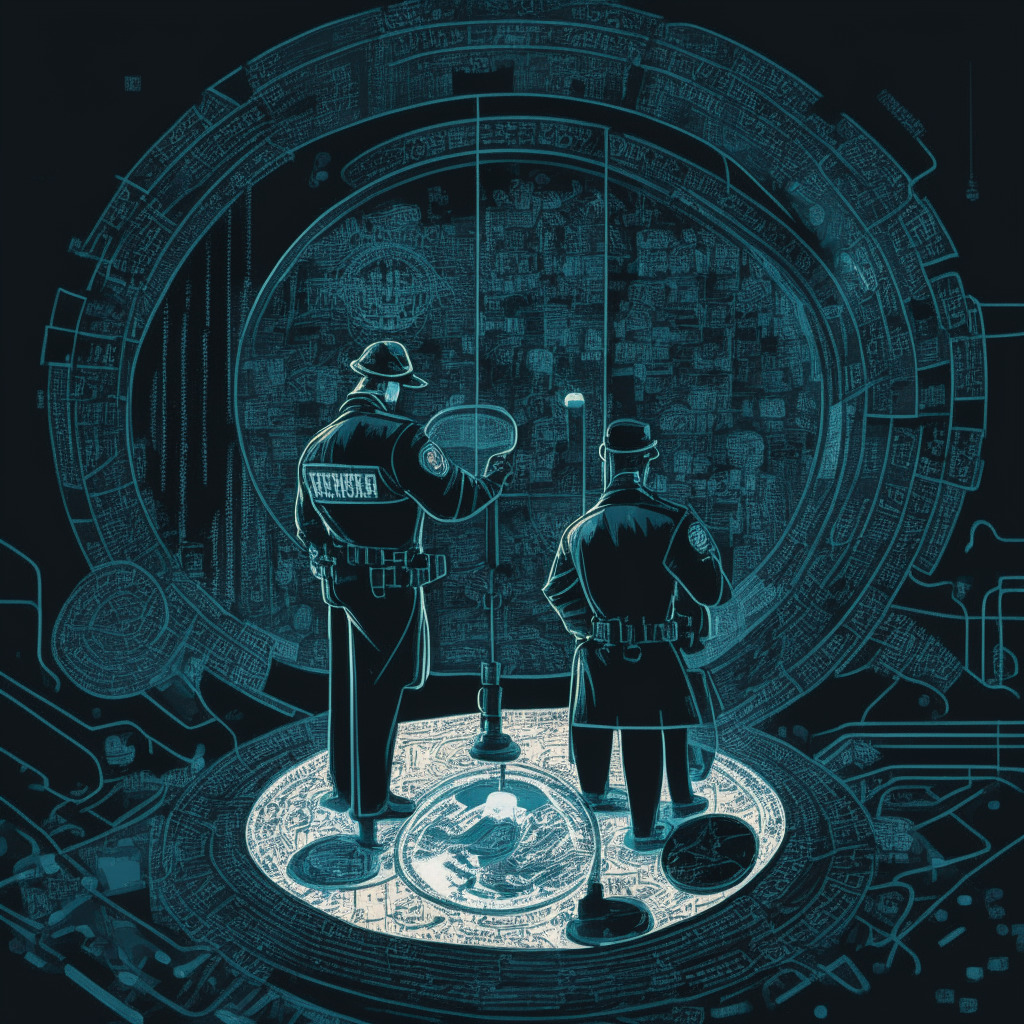“Binance expands its zero-fee trading to Argentine, Brazilian, and South African currency spot trading pairs. This move is seen as an attempt to increase trading of prominent cryptocurrencies against mentioned fiat currencies, despite confronting legal and regulatory hurdles, especially in the U.S. and Europe.”
Search Results for: chainalysis
Bitcoin ETFs and Crypto ATMs: The Balancing Act of SEC Regulations in the Crypto World
“The United States Securities and Exchange Commission (SEC) is delaying its decision on applications for a spot Bitcoin ETF from institutional giants. Additionally, the crypto ATM industry is under scrutiny for alleged illegal behavior and high usage fees, while facilitating convenience and anonymity. Regulatory development is vital for the industry’s well-being and participant safety.”
The Balancing Act: Crypto ATMs Between Accessibility and Accountability
The crypto ATM industry in the U.S is expanding despite concerns about illegal activities, according to the Federal Reserve Bank of Kansas City. While these ATMs cater to cash users and provide convenience, their high fees and potential for facilitating scams pose significant risks. Effective regulation is necessary to balance industry growth and user protection.
Funding Success and Regulatory Hurdles: The Rise and Tribulations of Crypto in Dubai
“Dubai-based cryptocurrency exchange BitOasis has garnered substantial investor funding, particularly from Indian digital-asset platform CoinDCX. Despite challenges, it remains a key market player in the Middle East and North African regions, amidst notable growth in the crypto sector. Dubai continues to emerge globally as a leading crypto hub, necessitating increased regulatory oversight.”
Federal Reserve Meeting Affects Bitcoin and Ether Values: Crypto Exchange Boosts Liquidity Security
“Bitcoins remain steady as attendees anticipate Jerome Powell’s speech in Jackson Hole. Expectations are tempered, however, by Bank of America’s doubt for strong policy directives from the meeting, causing Bitcoin and Ether values to slip. Meanwhile, Binance seeks to boost liquidity security for low-liquidity token crypto projects and new stablecoin nCOP is introduced on the Polygon network in Colombia.”
Num Finance’s nCOP: Bringing Blockchain Innovations to Colombia and Beyond
“Num Finance has launched nCOP, a token pegged to the Colombian peso, utilizing the Polygon framework for transfer, payment, saving, and earning through blockchain. Stablecoins offer flexibility and can be used for remittances, store of value, and potentially yield profit.”
Irony in Crypto: $7.3M Heist on ‘Optimism’-Based Exactly Protocol, a Call for Enhanced Regulation
“The Exactly Protocol, victim of a recent exploit resulting in a $7.3M loss, is offering a $700,000 bounty for information leading to the perpetrator’s capture. The hacker slipped through security measures, deploying a harmful contract and stealing deposited USDC. Following the hack, Exactly Protocol proposed a fix, alerting the community and attempting to negotiate with the hacker, who has not responded.”
Cryptocurrency Adoption in Emerging Economies: A Boon or a Bane?
“Emerging economies are becoming cryptocurrency adoption centers due to unstable fiat currencies and limited banking access. However, a study by the Bank for International Settlements suggests that cryptocurrencies have “amplified financial risks”. The authors propose regulation rather than an outright ban, aiming to channel innovation into socially useful directions.”
Cross-Chain Bridges: The Boon and Bane of Crypto Realm – A Deep Dive into Recent Hacks
Decentralized lender Exactly Protocol suffered a $12 million loss due to a bridge exploit. Blockchain security firm De.Fi reports the value locked on the protocol dropped by $10 million. As cross-chain bridges continue to see growing popularity, bridge-related hacks have cost over $2 billion last year according to Chainalysis.
Cryptocurrency Conundrum: Unpacking the $12 Million Bridge Attack on Exactly Protocol
The recent attack on Exactly Protocol led to a significant loss of about 7,160 ether, equivalent to around $12.04 million. This has highlighted the growing trend of cross-chain bridge attacks and raised concerns about the security vulnerabilities within the crypto world. While the potential of blockchain technology is undeniable, its future is indefinitely tied to the ability to counteract increasing security threats.
Ransomware Attacks: The Ethical Dilemma of Paying Cyber Criminals in Cryptocurrency
“Ransomware presents an ethical quandary: fulfilment of ransom demand might restore operations quickly, but it also encourages more offences by funding future attacks. Banning ransom payments could push organizations to boost cybersecurity measures, but it might adversely impact victims. A combination of technology-driven solutions, policy measures and human alertness is needed to combat escalating cyber threats.”
Crypto-friendly Libertarian Candidate’s Surprise Victory in Argentina: A Shift or a Risk?
“Libertarian candidate Javier Milei, known for endorsing Bitcoin and advocating for abolition of central banks, surprisingly won the preliminary presidential election in Argentina with 30.5% of votes. His success may affect Argentina’s crypto adoption and policy-making considering prevalent economic issues like the high inflation rate.”
Canadian Police’s Blockchain Move: Balancing Freedom and Security in the Crypto World
The Royal Canadian Mounted Police (RCMP) plans to develop a digital asset solution to streamline storage and safeguarding of cryptocurrencies and NFTs, facilitating the top 20 cryptocurrencies by market capitalization. This move reignites the conversation about the balance between control and freedom in major aspects of blockchain technology.
Harnessing Blockchain for Crime-Busting: Canada’s Progressive Approach and Privacy Concerns
Canadian law enforcement is utilizing the Chainalysis Reactor software to trace cryptocurrency crimes, adding a significant layer of accountability to the digital asset world. This technology reviews transaction patterns and tracks digital currencies to illegal activities, aiding investigations significantly. Despite potential criticisms of overregulation and privacy concerns, this marks noteworthy progress.
Blockchain Bandits: Breaking Down the Billion-Dollar Bitcoin Heist and its Repercussions
Russian-American tech entrepreneur, Ilya Lichtenstein, and wife Heather Morgan (aka rapper Razzlekhan) confessed to masterminding the 2016 Bitfinex cryptocurrency exchange hack, laundering a stunning $4.5 billion worth of stolen Bitcoin through an intricate network of shell companies and anonymous wallets.
Unmasking Crypto Anonymity: The Controversy and Consequences of Arkham Intel Exchange
Arkham Intel Exchange, a new platform offering monetary rewards for identifying anonymous crypto users, is sparking debate within the digital currency industry. Despite privacy concerns, many are utilizing the service to expose those behind major crypto exploits. Arkham exemplifies the intricate balance between crypto’s privacy struggle and the desire for transparency.
Digital Assets in War: Analysing Ukraine’s Crypto Boost amid Russian Conflict
Ukraine has benefited from the decentralized nature of cryptocurrencies amid the Eastern European conflict, with $225 million worth flowing into the country for essentials such as weaponry and medical supplies. Despite slowing donations, financial backing persisted. Notably, most contributions geared towards humanitarian initiatives than military operations. USDT emerged as the primary donation currency, followed by Ether, Bitcoin, and others. Contrastingly, Russia’s crypto fundraising has been lesser and subtle. Technology and economic strategy in crisis times aren’t free from potential manipulations and concealed transactions.
North Korean Blockchain Heist: Unraveling the $37.3M CoinsPaid Cyber Breach
“Cryptocurrency platform CoinsPaid experienced a breach resulting in a $37.3 million loss, suspected to be orchestrated by state-backed Lazarus Group. Depicting the latent risks of crypto and systemic vulnerabilities, the incident emphasizes the necessity for robust security measures in the crypto-space.”
LayerZero’s Success & Blockchain’s Security Challenge: A Tale of Promise and Peril
“LayerZero, an interoperability platform, has achieved a significant milestone by exceeding 50 million messages sent across its integrated networks, signifying global demand for liquidity transfer and token exchanges. However, amidst this progress, risks are evident with $2 billion worth of assets being hijacked off their owners by bridge exploits in 2022 alone. Blockchain’s future sees equal parts promise and caution.”
Unmasking Blockchain Investigation Tools: Are They Just Art, Not Science?
“The reliability of blockchain investigation toolkits like Chainalysis’ Reactor may not be as dependable as assumed. With questions raised about its scientific evidence of accuracy, its widespread usage – causing possible unjust account restrictions and unwarranted legal scrutiny – is concerning.”
The Future of Blockchain: Balancing Innovation with Stability and Security
“China’s mobile payment giants, WeChat Pay and Alipay, have abolished the requirement of a local bank account for foreign visitors, enabling international credit cards. Meanwhile, royalty volumes for NFTs on the Ethereum Blockchain have significantly dipped, causing concerns about their sustainability. Banks in Korea are exploring CD tokens as a stable alternative. Crypto wallet, Zengo introduced a premium subscription, and discussions on security vulnerabilities in crypto are ongoing.”
Blockchains Future: A Tale of Innovation, Regulatory Challenges and Intensified Crypto Adoption
“The future of blockchain technology is promising yet complex, as seen with events like Litecoin’s robust performance, Polygon’s proposed token nomenclature revision, and regulatory challenges worldwide. Developments like Coinbase’s secure messaging system and Google Play’s digital asset integration highlight the merging of conventional institutions with blockchain, while caution remains due to persistent crypto scams.”
Crypto Fraud Takes a Dive in 2023: An Analysis of Decreasing Delinquency and Its Implications
“Cryptocurrency-linked delinquency has reduced by 65% in 2023, according to Chainalysis. Illicit cryptocurrency transactions are declining faster than authentic ones, indicating stronger security measures in the industry. However, ransomware activities have increased, potentially due to the Russia-Ukraine conflict.”
Circle’s Reshaping Strategy: A Crisis Measure or a Pursuit of Global Markets?
Stablecoin issuer Circle has strategically pared down its workforce and redirected focus on its core business, in response to the prolonged downturn in cryptocurrency markets. They continue to employ globally in key areas and show growing interest in Asian markets.
Ransom Attacks: A Rising Threat Amidst Reducing Crypto Scams – An In-Depth Analysis
A substantial 77% decline in crypto scams is offset by a worrying rise in ransom attacks, seeing a 62.4% increase in perpetrator revenue. Large organizations are increasingly targeted for maximum extraction. Despite falling scam revenues reflecting heightened awareness, the future of blockchain security deals with challenges from sophisticated ransom attacks.
Crypto Crime Shifts: A Decline in Scams but a Rise in Ransomware Attacks
“Cryptocurrency criminals are seeing decreased earnings due to a fall in scams and hacking, reporting a deficit of around $2.5 billion, a 65% decline compared to 2022. However, ransomware attackers continue to extort money, amassing nearly $450 million this year alone. The landscape presents a mixed scenario for crypto enthusiasts, with fewer scams but continued illicit activities.”
Cracking the Code: Balancing Bug Bounties and Professional Audits in Blockchain Security
This article discusses the rising significance of bug bounties in the blockchain realm, noting that approximately $1.3 billion in crypto has been stolen from platforms, highlighting the need for such cybersecurity strategies. However, relying solely on them may introduce bias and oversight issues, stressing the need for a balanced approach of robust security audits and community participation.
Navigating the Roaring Tides: The Confluence of Stablecoins, CBDCs and China’s Economic Strategy
Jeremy Allaire, CEO of Circle, suggests that a Yuan-backed stablecoin could aid Beijing’s goal of widespread acceptance of the Chinese Yuan. However, he notes that strict economic policies and capital controls could be potential obstacles. Allaire highlights that despite the challenges, stablecoins have proven beneficial for overseas monetary remittances, particularly for Chinese firms.
Unraveling the Multichain Mystery: Inside Job or Outsider Exploit?
“Cryptocurrency enthusiasts were alarmed by reports of Multichain’s suspicious withdrawals and possible internal fraud or “rug pull”. Questions arise over its administration’s integrity and security, highlighting the need for robust security measures, comprehensive internal protocols, and regulatory oversight in cryptocurrency platforms.”
Top Global Crypto Hubs of 2023: Unraveling the Methodology & Ranking Debate
This article examines the challenges of ranking global crypto hubs for 2023, using criteria such as regulatory environment, grassroots adoption, quality of life, and networking opportunities. Acknowledging limitations and biases, the authors invite feedback from the crypto community.
Unexpected Consequences: Nigeria’s 10% Crypto Tax Hurdles and Future Blockchain Prospects
Nigeria’s 10% capital gains tax on digital asset profits faces hurdles due to the country’s uncertain stance on cryptocurrency. The complex nature of crypto transactions, reliance on self-reporting taxes, and central bank’s restrictions contribute to these challenges. Stakeholders call for friendlier policies to ensure market growth.
IMF’s Stance on Crypto and CBDCs in Latin America: Accelerated Adoption vs. Regulations
The IMF discusses the accelerated adoption of cryptocurrencies and CBDCs in Latin American and Caribbean countries, stating that well-designed CBDCs could simplify remittances and financially include more citizens. However, they emphasized the need for proper regulation and consider crypto to be risky overall.































